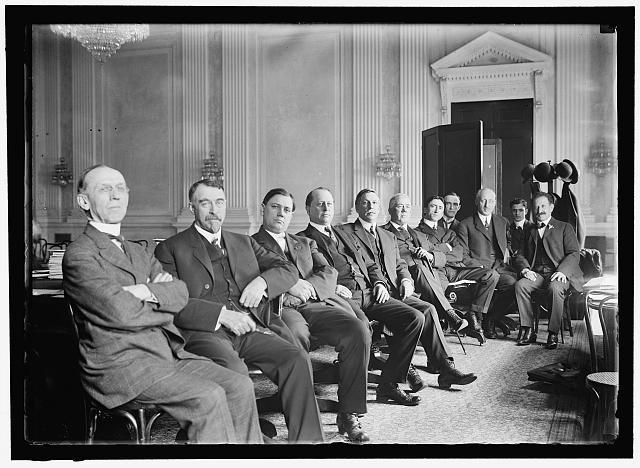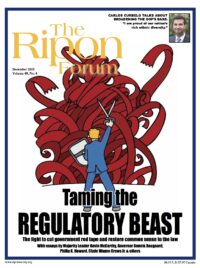
The battle line between right and left is drawn at big government vs. smaller government: But it’s largely a battle of rhetoric, not reality.
Government is big, really big — with 438 federal agencies and so many thousands of programs that no one has counted them. More are added every year. Big government is winning. Republicans are relegated to fighting a rear guard action — for example, with the proposed REINS Act, to prevent government from getting even bigger by asserting legislative authority to veto major new regulations.
What accounts for the invincibility of big government? Americans know it’s broken. According to a Clarus poll, over 80 % of Americans believe the federal government needs to be overhauled. Most liberals see the absurdity of wasteful and duplicative programs. Why can’t the will of the people get transformed into legislative change?
The roadblock is not ideological, but structural. Congress must change how laws are amended if it wants to take back control of government.
Our system favors the status quo. The rules of Congress make it almost impossible to repeal or modify old programs, no matter how broken or obsolete. Part of the blame lies with the Framers: they thought they would deter big government by making it hard to enact new laws. What they didn’t anticipate was that the same checks and balances make it hard to amend old laws. The second part of the blame lies with post-1960’s culture changes, weakening authority in favor of individual rights throughout society, including within Congress. Speaker Sam Rayburn’s authority is a distant memory. All that’s needed to keep programs in place is a few congressional supporters.
American government is not managed by majority vote. It is run, as political scientist Francis Fukuyama puts it, as a “vetocracy.” Any small group can prevent change. Who, then, is in charge?
Nobody.

American government today is run by dead people — past members of Congress who wrote all these statutes, and bureaucrats long gone who wrote the millions of words of regulations.
American government today is run by dead people — past members of Congress who wrote all these statutes, and bureaucrats long gone who wrote the millions of words of regulations. Year after year, all these programs have piled up — with 82 teacher quality programs, 47 job training programs, and procedural mazes that make common sense illegal in almost every public choice. From the White House to the school house, everyone in government, even the President, is stuck in all this legal goo.
Congress accepts all this law as a state of nature. But no one designed this regulatory swamp. Congress in 1933 never intended Depression farm subsidies to be paid to corporate farmers 80 years later. Congress in 1975 never intended special education to drain over 25% from the total K-12 budget. Congress in 2008 didn’t expect Dodd-Frank to drive small banks into the arms of mega-banks that are too big to fail.
Government is broken not mainly because past lawmakers were stupid, but because legislative programs almost never work out as planned. Like riding a bike, you must lean this way and that to stay upright. But Congress almost never adapts laws when circumstances change. So they crash. It’s hard to find a government program that isn’t broken to some significant degree. The flaw is usually in implementation, not the regulatory goal. Most Americans think the FDA should approve new drugs. But should the approval process cost a billion dollars and take a decade? Environmental review of infrastructure projects is supposed to be 150 pages and take a few months — not run 10,000 pages and delay projects by a decade.
At this point, 50 years after the surge of regulation that began in the 1960s, American government is, literally, out of control. Laws and regulations passed decades ago plow into the future irrespective of changing needs and priorities. Government is too big, but not because it’s designed to work this way. Government is too big, and wasteful, and ineffective, because neither Republicans nor Democrats in Congress have the ability to adapt old programs to new realities.
The cure to runaway government is structural, not ideological. Congress must change its rules to reassert control over existing law. This should be approached not as a partisan battle of big government vs. small government, but as restoring the foundation of democratic responsibility.
Government is broken not mainly because past lawmakers were stupid, but because legislative programs almost never work out as planned.
Congress must take responsibility for all legislative programs, not just new laws. What’s needed is a practical way to adapt old law to meet new circumstances. This requires delegation of responsibility to smaller committees, subject to approval (but not micromanagement) of the whole. Here are two ideas:
1) To push the reset button on obsolete law, Congress could authorize independent committees to make overhaul proposals in each area, and then, as in the BRAC model, vote the proposals up or down;
2) Going forward, congressional committees could have presumptive authority to change existing programs to make them work more effectively, and be accorded deference by majority vote except in unusual circumstances. This would work best as a matter of comity, so that leadership of either party could object if the changes effectively undermined the original legislative compromise. Another variation might be for committee amendments to earn deference if supported by a supermajority committee vote.
It’s not that hard to bring programs back to reality. In many areas, broken programs can be readily fixed by creating clear lines of authority and accountability. For example, combining overlapping programs into one coherent structure only takes a few legislative lines. Streamlining infrastructure red tape from 10 years to two years can be achieved by giving the White House authority to resolve disputes among agencies. The total legislative package needed to cut through the red tape and unleash a surge of infrastructure investment — enhancing America’s competitiveness, creating a greener footprint and creating 2 million jobs — is less than three pages. (This proposal by the nonprofit Common Good, which I chair, can be found at www.commongood.org.)
Of course, no legislative reforms will work with hyper-partisanship. That’s just a formula for continued paralysis. Because the real enemy is the status quo — a huge, bloated blob of ineffective government programs — and continued stalemate is the worst possible result. The only way to bring big government under control is for Congress to reclaim its authority to regularly update existing legal frameworks.
Philip K. Howard chairs Common Good, which advocates common-sense reforms of law and government. He is the author of several books, including The Rule of Nobody (2014) and The Death of Common Sense (1995).




